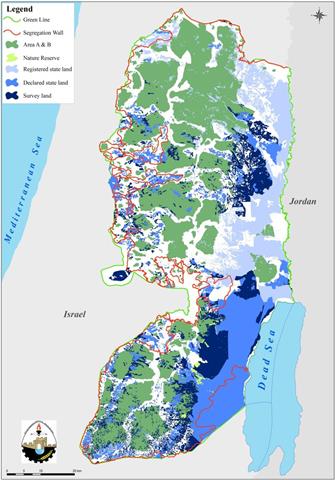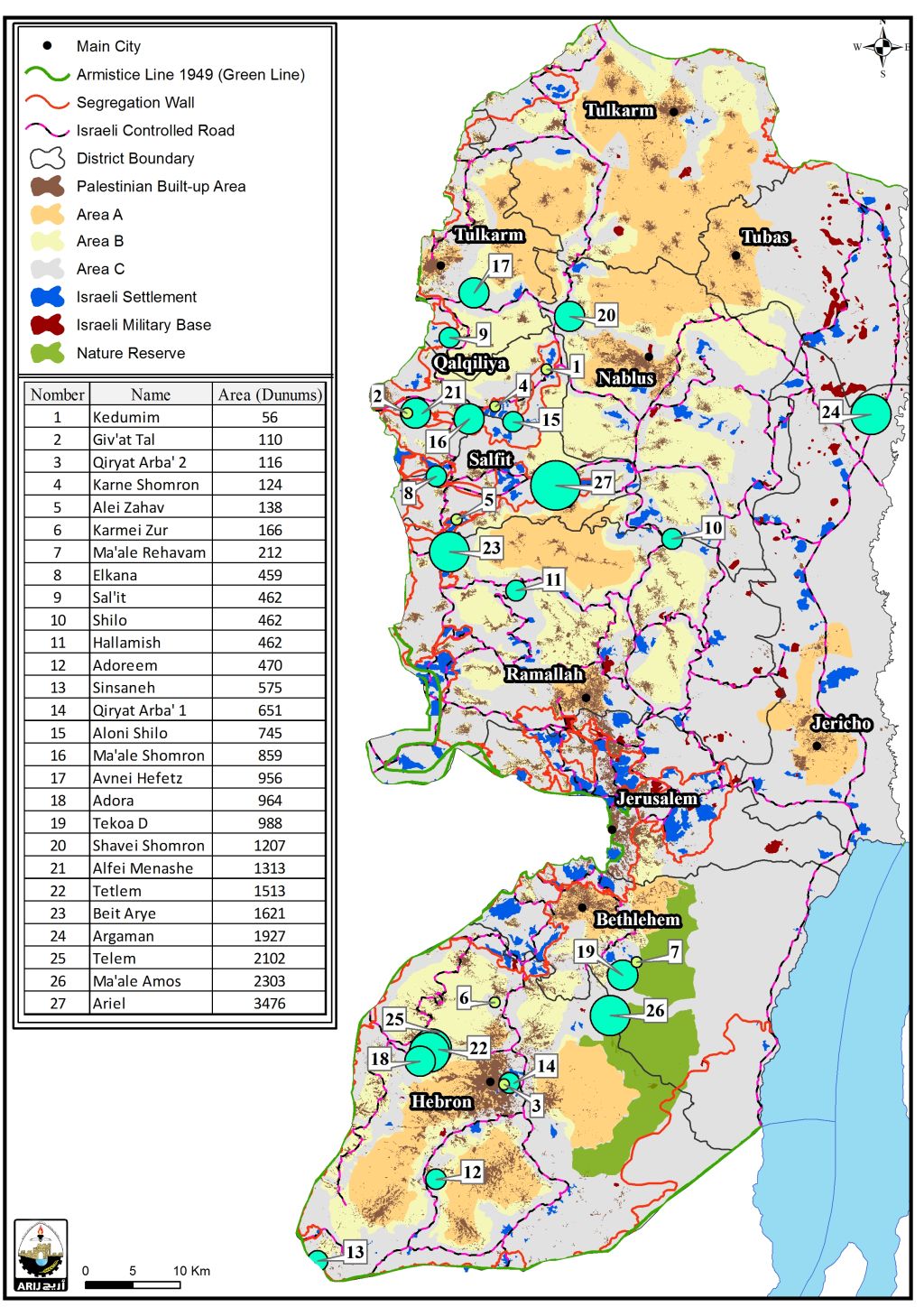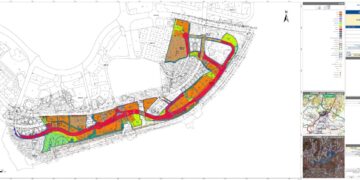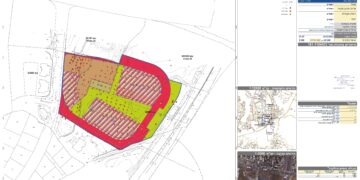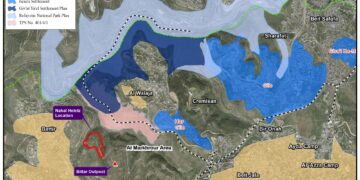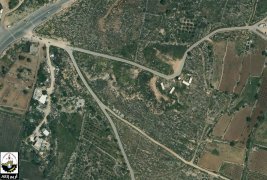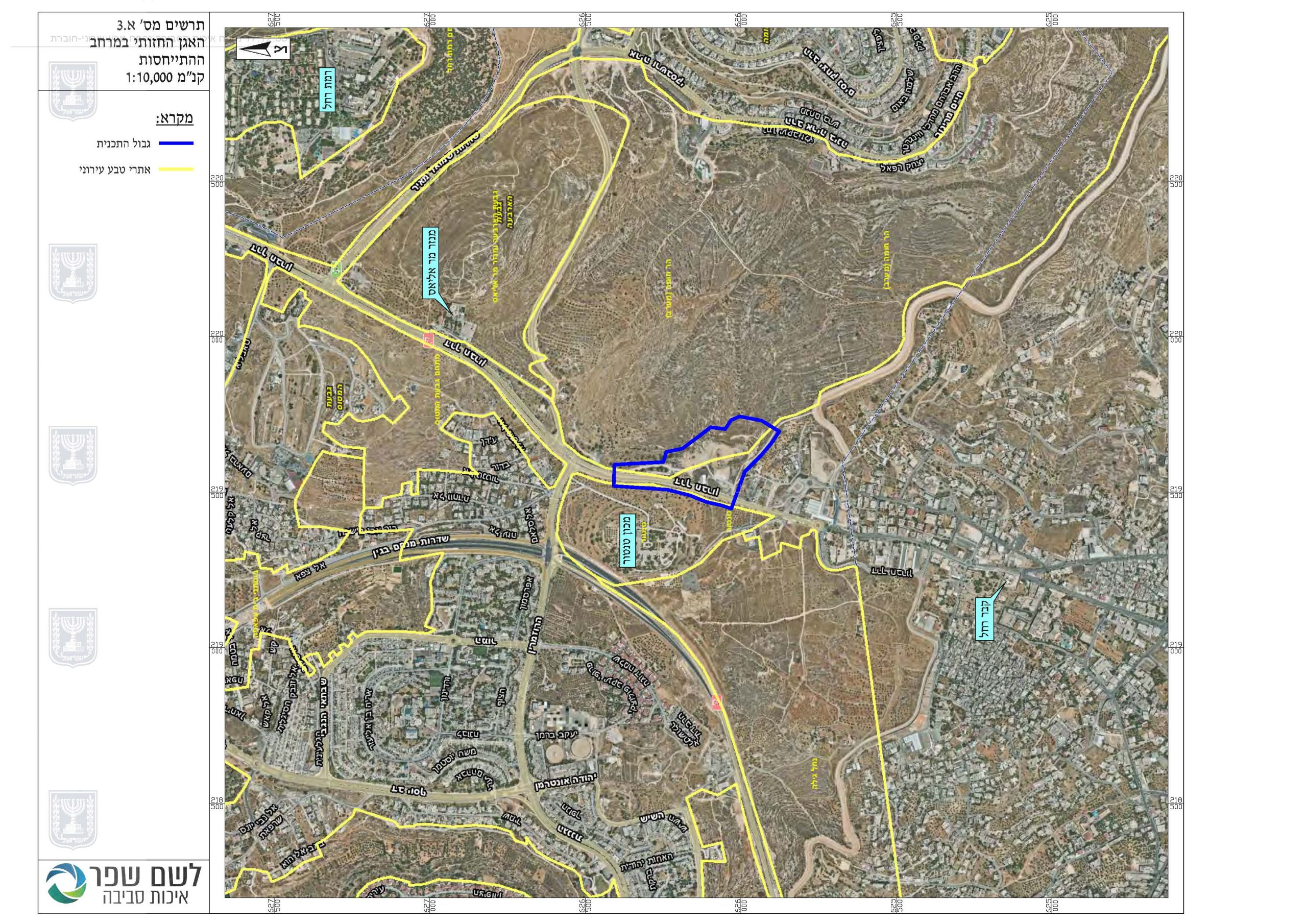Over the past year (2013), a record amount of land has been confirmed as ‘state lands’ by the Civil Administration's task force for demarcating state land. The Applied Research Institute-Jerusalem (ARIJ) has conducted a vast array of primary source research into settlement expansion over the past decade, however Israel’s actions are now becoming more apparent, making headlines within Israeli mainstream media.
On April 29th ,2014, Chaim Levinson of Haaretz Daily Newspaper reported the announcement made by the head of the Israeli Civil Administration's task force, Maj. Gen. Yoav Mordechai, to the Knesset Subcommittee. The Maj. Gen. confirmed that his task force had been re-examining land designated imprecisely during the 1980s as belonging to the state and that, as a result, over 28,000 dunums (6,919 acres) had been approved for reclamation. See Graph 1
One must take into account that this task force was in full operation, making pivotal changes to the demographics of the Ariel settlement and throughout the southern Hebron hills during the ongoing peace process. To put it simply, whilst Tzipi Livni and her team of negotiators were discussing details of a two state solution, members of the Israeli Knesset and military were seeking to jeopardise the negotiations by annexing occupied Palestinian land and violating the Oslo Accords. This not only highlights Israel’s subtle pro-settlement policies, but also makes evident the divides within Israel’s own political framework.
Policies which act as a fulcrum in balancing support for the expansion of established illegal Israeli settlements and the legalization of formally illegal settlements and outposts are nothing new in Israeli politics. In 2012 the Israeli government moved to probe ways in which it could legalise formally illegal settlements within the West Bank, with the Prime Minister's Bureau announcing the formation of a panel which would "examine real estate issues in the West Bank". The panel issued a legal opinion on the issue of abandoned property in the territory which argued that the Israeli Civil Administration had the authority to lease this land to settlers. This completely contradicted a legal opinion written by the Justice Ministry 20 years ago, which states that “abandoned land cannot be used to build new settlements”. Whether it is an issue of declaring sections of Area C as state land for future development, or legalizing formally illegal settlements in order to appease voters and Jewish ambitions, Israel is subtly annexing the occupied territory, piece by piece.
The influx of state land declarations has been noted by observers within Israeli society who monitor the ongoing settlement expansions. Dror Etkes, who works with Rabbis for Human Rights, comments: “Anyone examining the places where territory was added to the land under settlement jurisdiction, and the work of the subcommittee from early 2013 until today, is forced to conclude that from the perspective of the Israeli government there is no Oslo, no fence, and no negotiations”.
Etkes continues to suggest that, as far as the Civil Administration is concerned, Area C is solely designated for Israeli settlement expansion, and that this is a practice which is now over 20 years old. Israel declared nearly 1 million dunums within Area C to be state land in the 1980s, after the Supreme Court ruled that it was illegal to seize land stated for military purposes and settlement construction. Contrary to the Supreme Court ruling, once the land became state owned, 99% was allocated to settlements. The task force which is currently in place to assess the status of land in which settlements and outposts are placed will be re-examining the legality of current outposts and settlement buildings. Unless they go through these re-examination processes, Israeli agencies cannot authorise development plans or move forward on evacuation plans. It works both ways.
It is becoming increasingly apparent, however, that authorising the establishment of new state lands within Area C, and establishing corridor settlements which link established settlements is in vogue with the Israeli government and a number of appointed committees. The Israeli Civil Administration's task force can re-establish state lands within Area C, and the Israeli Occupation forces administration can declare military firing zones. Both groups subtly drive the advancement of Israeli settlements, as unlike the veteran Palestinian villages, settlements are not included within these firing zones. However, if an outpost has expanded into a firing zone then its Israeli residents are rarely removed.
In a report by PEACENOW Israeli movement, it was stated that the Netanyahu administration not only issued tenders but also failed to oppose the construction of two new outposts in the Jordan Valley and in the south of Bethlehem. In analysing the 2013 data acquired by Haaretz, it was found that over 3,000 dunums had been declared in the Bethlehem Governorate and was to be awarded to the settlement outpost of Ma’ale Rahba’am (212 Dunum), Tequ’ D settlement (988 Dunum) and Ma’ale Amos settlement (2303 Dunum). However, the activity of expansion is also occurring within the Hebron Governorate, where 32 percent (7,909 Dunum) was declared state land in 2013, including Kiryat Arba settlement, Har Manoh outpost, and Karmei Zur settlement. See Map 1
Map 1: Israeli Settlements targeted with expansion as reported
by Haaretz daily Newspaper, April 2014
It must be noted that 59 percent of dunums acquired were east of the Israeli segregation wall, which clearly shows that the Israeli government has no interest in ending its occupation within the West Bank territory. If the current Israeli government did believe in achieving a two-state solution then why would they continue to pour in settlers, who in 10 years’ time will be immovable from those locations. See Graph 2
These developments simply highlight the divide within Israel’s internal politics where the right, the settler communities, and the more devoted Jewish communities have little time for the peace process and know how to play politics with the current Israeli premier. Netanyahu needs the support of these factions if he wishes to stay in power, as this is the section of Israeli society who will vote – and if they do not get their way, they will rise against the ruling government.
Therefore, when the Israel government is being pressured by the international community and sections of Israeli society to establish a two-state solution with Palestinians, the rapidly procreating political right and settler communities are calling for advancements into Area C and for the creation of one state. The Israeli government therefore is constantly playing a game of deception with the international community, as they know that in 10 years time it will be the latter group with the most voting power. Israel may be the only democracy in the Middle East, but this may prove to be its downfall.
Prepared by:
The Applied Research Institute – Jerusalem


